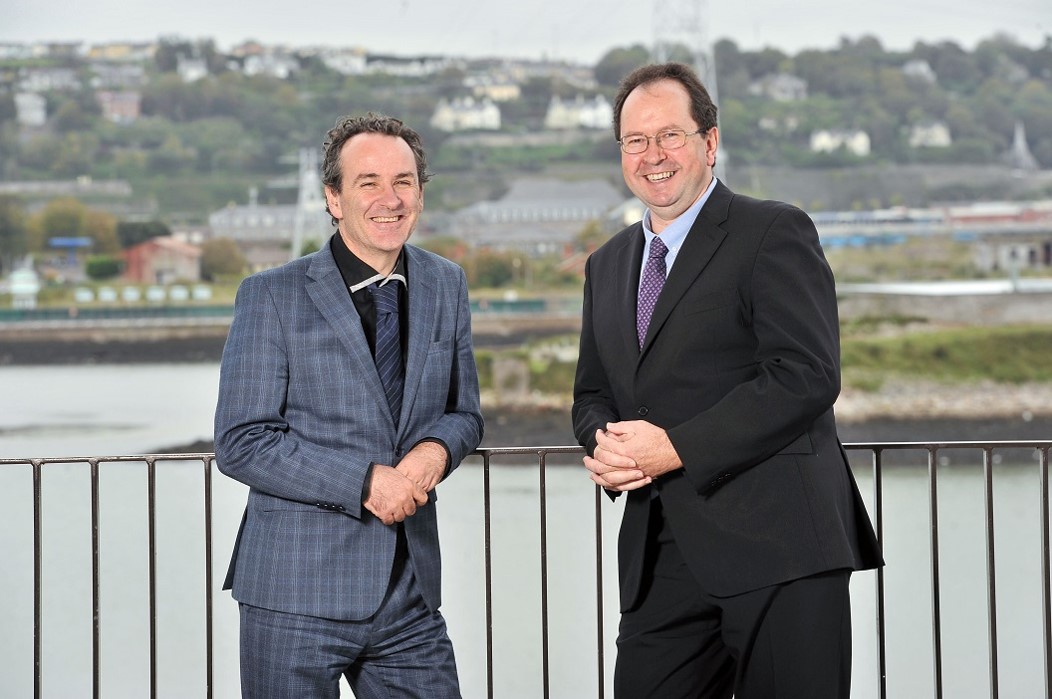MaREI Research Explores How We Can Decarbonise the Energy System

The Irish Government has recently published a revised set of national research priorities. This has resulted in replacement of “Marine Renewable Energy” and “Smart Grids and Smart Cities” with “Decarbonising the Energy System” and “Sustainable Living”.
MaREI began its life as the Science Foundation Ireland (SFI) funded Centre for Marine Renewable Energy in 2013. Under the tutelage of the MaREI Directors (pictured below) and Manager (Dr Gillian Bruton) MaREI has evolved to a Centre for Marine AND Renewable Energy, with 200 researchers, nearly 50 industry partners, and cumulative funding of €55M. MaREI’s mission to assist Ireland’s transition to an internationally competitive, low-carbon sustainable society is perfectly positioned to deliver on these revised national research priorities.
MaREI puts an emphasis on the broader integrated energy environment system and embraces the complexity of sustainability and the multiple solutions and the many different disciplines required to solve these problems.
Prof Murphy’s research is in advanced transport fuels
There is a preoccupation in Ireland with Renewable Electricity; this is good but it is too narrow and simplifies the issues, as final energy in transport is twice that of electricity.
Advanced biofuels do not use land for cultivation of biomass. Hence the ocean, which is rife with marine biomass is a great source of such fuel. Our research in MaREI is the first to describe the whole seaweed biofuel system. We start with the circular economy concept of growing seaweed as a means of enhancing water quality around fish farms, which increases yields of the seaweed. Our research has assessed: different cultivation methods and harvest dates for a range of seaweed species; pretreatments; ensiling; optimal conversion process including for bioethanol, biohydrogen, biomethane and volatile fatty acids; microbial genomics; and optimization of the entire system to ensure satisfaction of sustainability criteria.
Another aspect of the work is the integration of bioenergy with intermittent renewable electricity systems (such as wave turbines and offshore wind). Biogas can be produced on demand, can be stored and as such is dispatchable and flexible. We can produce peak output of bioelectricity at times of peak demand for electricity (early mornings and tea time). On the other hand, when there is too much electricity, we can convert surplus electricity to hydrogen, or methane or other so called electro-fuels. Thus bioenergy and biofuel systems integrate seamlessly into the future smart energy grid, acting as a battery and facilitator to intermittent renewable electricity. A synthesis of these works has led to three International Energy Agency Bioenergy reports confirming MaREI’s role as world leading in advanced gaseous biofuel.
MaREI is a Centre peopled by multi-disciplinary researchers
The work in MaREI is multi-disciplinary including engineers, scientists, biotechnologists, microbiologists, marine scientists, lawyers, economists and modelers. The basic research across the Centre comprises of numerous marine and energy systems for ocean energy devices, wind turbines, robotics, electric vehicles, and bioenergy and biofuel systems. The output from this research is fed to the Energy Policy Modelling Research theme led by Prof Ó Gallachóir.
Prof Ó Gallachóir informs Ireland’s energy and climate policy
MaREI research is being used to inform Ireland’s strategies and policies for climate action. This is set against a context of legislation enacted in Ireland in 2015 on climate action, which provides a legal framework for Ireland’s transition to a low carbon economy by 2050. MaREI research is focussing on how we can deliver on this ambition.
Within MaREI, we are researching the technical, economic and societal opportunities and challenges associated with Ireland’s transition to a low carbon future. We develop technology roadmaps that show how we can move away from our high dependence on fossil fuels (including oil, peat and coal) and how to harness the opportunities from our own wind, biogas, solar, biofuel and ocean energy resources. We translate these into policy roadmaps to ensure that we can deliver these in a timely manner. This latter point is critical given that Ireland is currently not on track to meet our 2020 targets for renewable energy or for greenhouse gas emissions reduction. Our research shows we are facing a bill of up to €455 million.
In addition to the technology and policy aspects, a growing area of MaREI research is on the societal dimensions of the energy transition. We have many international research collaborations focussing on the technology and the economic perspectives of energy and climate change. The people part of the solution to the energy transition is both key to success and poorly understood. We are engaging in very interesting new areas of research with our colleagues in Sociology, providing new insights into the transition to a sustainable society.
MaREI with its 200 researchers and ca. 50 industry partners is ideally placed to solve the problems associated with the new research priorities “Decarbonising the Energy System” and “Sustainable Living”.
Energy Engineering
Contact us
School of Engineering Office, Electrical Engineering Building, UCC, College Road, Cork.
